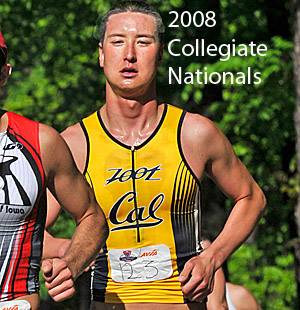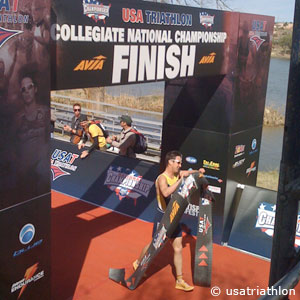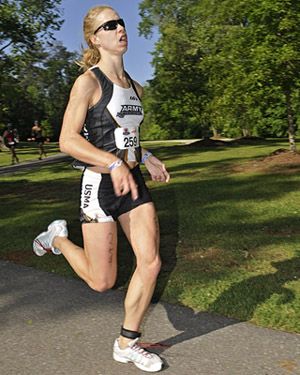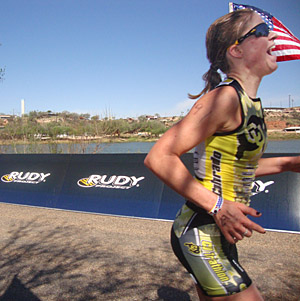Q&A with John Dahlz

John Dahlz of UC Berkeley was a co-favorite going into this year’s USAT Collegiate Nationals, perhaps as much for the two and a half years he spent in the USA Triathlon Development teams as for his previous Collegiate Nationals individual results. Dahlz was 4th at the 2006 edition held in Reno and took time off in 2007. He finished 10th last year at USAT Collegiate Nationals in 1:59:19, with an 18:14 swim, 1:01:42 bike and a 38:16 run, the second man on UC Berkeley’s winning team behind overall winner Steve Sexton. At the 2008 USAT Elite Nationals, Dahlz finished 16th in 1:59:46, in a slower time than UC Berkeley teammate Kenneth Rakestraw, who finished 3rd in the 20-24 age group. But Dahlz finished ahead of Navy’s Derek Oskutis (19th) and Army’s Nicholas Vandam (25th) at Hagg Lake. Dahlz’s recent form was good – he won the Golden Bear Triathlon overall last month, although he crashed at the West Coast Collegiate Championships just three weeks before Lubbock. The 5-10, 155 pound senior in political science held serve on the swim at Lubbock, but really won it with a do or die breakaway on the bike.
Slowtwitch: There were reports you just recovered from crash on the bike? How did it affect your race?
John Dahlz: Funny enough, in the past year I’ve averaged a bike crash every three months. I crashed 3 weeks before Collegiate Nationals in a tune-up race, the West Coast Collegiate Championship in Santa Barbara. It was a stupid mistake. I was looking down at my shoes to strap in when I hit a pothole. It was another cold day like Lubbock. I was in a daze when I started the bike ride, and went 100 yards before the crash. My teammate Kenny Rakestraw won. He’s an amazing athlete. He had a great year.
ST: How did you deal with the cold water in the swim?
John:I led the swim at first, then Nick Vandam went to the lead and gapped me. It was a tough swim. The glare off the water was bad and sighting was an issue. We had 53 degree water and when you hopped in, I am sure we were all awake. Luckily I live in San Francisco and I am used to cold water in all the races on the West Coast are all 55 degrees or below. Still, it takes your breath away. You can’t feel anything coming out of the water. That was good in my case. Especially after my bike crash, the numbing effects were welcome in this case. All my extremities were pretty numb.
ST:On the swim, your 6th-fastest 21:05 split was 7 seconds behind Nicholas Vandam of Army, 12 seconds in front of Derek Oskutis of Navy and 1:51 ahead of Cedric Wane a tough cyclist-runner from CU Boulder. How the cold water affect you starting the bike?
John: When we got to shore, the air temperature was 48 degrees. I thought it must be a Collegiate Nationals thing. The last time it was this cold was in Reno in 2006 – and they turned it into a duathlon because the water was 50 or below. The air was 40-something there. But this race was definitely the next coldest after that. That race we did not have to swim. At least we were dry going into the bike. So at Lubbock I clipped into the bike OK. That could have been pretty rough. I was really lucky I was smoothly strapped in because right out of transition we went up a decent sized hill.
ST: How numb were you starting the bike?
John: I went as hard as I could on the swim and the bike. It was more survival than anything. I was trying to warm up. I finally started to get my rhythm 3 miles going into that first right hand turn of the bike. By then, the air temperature had warmed up a bit. Going out to the turnaround, I felt great. We had a very nice tailwind. But before the turnaround I was praying: “’Please be a cross wind, not a head wind.’ But coming back it definitely was a head wind.”
ST: What was the back and forth on the bike?
John: Nick Vandam was about 30 seconds behind at the turnaround and Derek Oskutis was on his tail. Outside those two, I didn’t pay much attention. Going into the bike to run transition, it ended up I had a minute plus lead on Nick and 2 minutes on Derek.
ST: On the bike, your 1:01:13 was the fastest split of the day and that leg put 2 minutes 15 seconds on Oskutis, 1 minute 23 seconds on Vandam and just 11 seconds on Wane. Coming off the swim and bike and both transitions, you had a 1:36 lead on Vandam, 1:38 on Oskutis, 2:59 on teammate Rakestraw, and 4:21 on Wane.
John: The funny part is that in ITU races I am not known for my bike. But I worked diligently on my time trial biking this off season. So this was one of those days I felt really smooth on the bike and I played all my cards there. I redlined on the bike, knowing Derek and Nick are extremely talented runners and I really wanted a buffer after the bike.
ST: It was both windy and full of rolling hills on the bike. Whom did this course favor?
John: On the bike, it was my impression that Nick and Derek generally like the flats. The group rides I do in Walnut Creek near Berkeley are both pretty windy. So conditions on those rides mimicked Lubbock. It’s a windy area with open plains open two lane roads with sections of very steep hills.
ST: Did the marshals keep a lid on drafting?
John: There was no draft. Charlie Crawford and the officials kept a close eye on us. At the meeting Charlie said they had 12 motorcycles covering various parts of the course. Also, it was tough to get away – the wind, the cold and the course was physically tough, with rolling hills.
ST: After you redlined the bike, how did you feel starting the run?
John: When I started the run, I felt pretty tapped out. It was pretty bad the first mile or so. I had the worst Jell-O legs I’ve ever had in any triathlon and I was worried I completely overdid it.
ST: What was did your competition stand at the run turnaround?
John: Nick was still in second place. I must have had 30 seconds on him. But when I saw Derek, that definitely got my heart rate going up. I knew he would gain ground pretty quickly but I didn’t expect he’d gained that much. And Kenny Rakestraw looked really good. I thought ‘Wow he is really flying.’ At that point, I was running for my life. The entire run was really a death march and I was just hanging on. I really badly wanted to win it, and I never looked back. After that point I just looked 10 feet in front of me on the road and I was hoping the finish line would magically appear.
ST: How did you feel after you’d hung on and held off Oskutis by 20 seconds, Wane by 29, and Vandam by 49 seconds?
John: I think so that was as close as it’s ever been. I was really glad to see the finish line. The swim was very long. I think it was roughly 200 meters long and I started to get tired out there and my arms fell apart. So I was really glad the run wasn't as long as the swim. I
ST: What did you think when you crossed the line?
John: I thought, ‘Man I did it.’ It was such relief and happiness. This was my last Collegiate Nationals. It was by far the biggest race I’ve ever won, The rest of my wins have been all local stuff — The Santa Cruz Sentinel, the Berkeley Triathlon, but nothing the caliber or quality of the field at the of the National Collegiate Championships.
ST: While you were focusing on Vandam and Oskutis, Cedric Wane came on strong at the end to finish ahead of Vandam and just 9 seconds back of Oskutis. Wane’s bike was just 9 seconds slower than yours, and his 34:14 run was 2:17 faster than you, eight seconds faster than Oskutis and 1:31 faster than Vandam.
John: Cedric Wane can run and bike, too He is a good all around guy. He can do it all as well.
ST: What’s your background?
John: I am from San Francisco. I’m an only child. My dad is the sole provider for our family and my mom takes care of the house. I am a pampered only child, so I took full advantage of laundry and meals privileges throughout college.
ST: What part did your time with the USA Triathlon development teams play in your success?
John: I was lucky enough to be chosen by USAT development teams from 2006 through 2008. . They helped me out in their Under 23 and elite development team from 2006 through 2008. During those years I focused just on ITU racing and did Under 23 worlds in Switzerland (2006) and Hamburg 2007). I did not do as well as I’d have liked,. But they were amazing experiences.
ST: What has a victory at the Collegiate Nationals come to mean in 2009?
John: Collegiate Nationals mean a lot. The strength of field, the quality of other athletes, and the atmosphere at the race with all the colleges there make it just a great atmosphere for a race. I am really close with my teammates, I’ve trained with them for so long, and they believed in me when I didn’t believe in myself. So to do it in front of all those people was great.
ST: Who’s your coach?
John: Andy Schmitz is our coach. He is absolutely smashing, we are really lucky to have him. He served as a USAT coach in Beijing. Hed has a plethora of experience and knowledge and is a great guy to talk to about the sport.
ST: Where do you think triathlon stands at his point in collegiate athletics? Do you think it should be a Division I sport and taken more seriously by athletic departments?
John: Honestly I don’t know what I think about it. I think if the NCAA made triathlon a Division I sport, schools might designate more funds and for travel and equipment and scholarships for triathlon. As it is the equipment is so expensive, everyone could use some help. At the same time, the way Collegiate Nationals are run as a club sport it is so cool. We have people of all abilities on the team and the people on it are closer and offer more mutual support. I kind of see Division One sports as like a business. I think that because it is a club sport, triathlon goes beyond that to have a greater camaraderie within the schools and between all the schools. In the US, we all just get along and it is a better experience. The funny part of this issue is that when I went to college, I wanted to run track at Cal, I talked to the coach and I would have walked on. But when I met them, something about the triathlon team got a hold of me. The camaraderie of the team is completely different than anything else I have ever experienced in sport. I fell in love with triathlon.
ST: You followed your teammate Steve Sexton as the National Collegiate men’s overall winner. What is he up to now?
John: Technically, he would have been eligible to race for us again this year. That would have been exciting. Unfortunately, he had bad luck in an ITU race in Peru and had heat stroke. That put him out for a while. No that UC Berkeley has a winning streak with the men’s title, hopefully Kenny Rakestraw (who was 5th, 26 seconds behind Vandam) will make it three in a row.
ST: After this, what’s next?
John: I am 24 and this year it is too late to apply anywhere. So right now, I will probably take a break. Then I will be looking to get back to grad school. After that I will go to law school. I hope there are still jobs out there with this economy.







Start the discussion at forum.slowtwitch.com